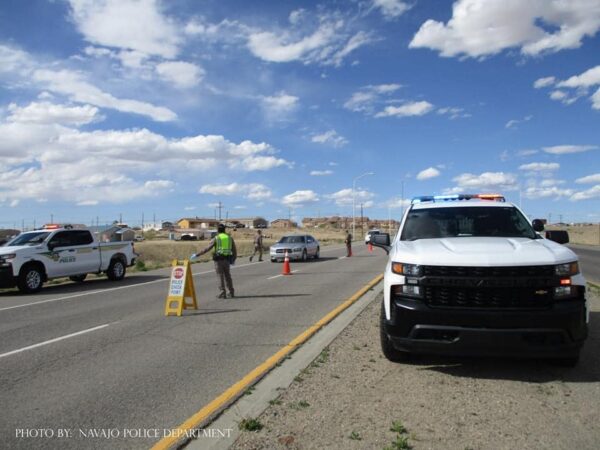
- Details
- By Levi Rickert
57-Hour Weekend Lockdown in Effect
WINDOW ROCK, Ariz. — With the rising number of COVID-19 cases still rising on the Navajo Nation, the country’s largest reservation will be under a 57-hours lockdown this weekend that includes all businesses, including grocery stores.
The Navajo Nation’s 57-hour weekend lockdown requires all residents to remain at home except essential workers, first responders, and health care workers. Essential businesses, including stores, gas stations, restaurants, drive-thru food establishments, hay vendors, and other vendors, shall cease all operations during the lockdown.
“Stay home and stay safe! People are wondering when there will be a vaccine for COVID-19, but we already have one and that’s staying home and practicing social distancing to prevent the spread of the virus. It’s discouraging to see many people traveling on roads and going to border towns, but there is also a majority of people who are listening to the health care experts and staying home as much as possible. Let’s think of our elders and those with underlying conditions before we go anywhere,” Navajo Nation President Jonathan Nez said on Friday.
During the weekend lockdown, Navajo residents can leave their homesites only in cases of safety, health, or medical emergencies. The Health Operations Command Center urges anyone who feels they might have signs and symptoms of COVID-19 to immediately contact their medical provider.
On Friday, the Navajo Department of Health in coordination with the Navajo Epidemiology Center and the Navajo Area Indian Health Service reported 108 new cases of COVID-19 for the Navajo Nation, which brings the total cases to 3,740.
The total number of deaths remains at 127 as previously reported on Thursday.
Preliminary reports from a few health care facilities indicate that approximately 519 individuals have recovered from COVID-19, with more reports still pending. The total number of positive COVID-19 cases for the Navajo Nation has reached 3,740.
For more information including reports, helpful prevention tips, and more resources, please visit the Navajo Department of Health’s COVID-19 website at http://www.ndoh.navajo-nsn.gov/COVID-19. To contact the main Navajo Health Command Operations Center, please call (928) 871-7014.
_______________________________________________________________
To Donate to the Navajo Nation
The official webpage for donations to the Navajo Nation, which has further details on how to support the Nation’s Dikos Ntsaaígíí-19 (COVID-19) efforts is: http://www.nndoh.org/donate.html.
_________________________________________________________________
For More Information
For more information including reports, helpful prevention tips, and more resources, please visit the Navajo Department of Health’s COVID-19 website at http://www.ndoh.navajo-nsn.
For up to date information on impact the coronavirus pandemic is having in the United States and around the world go to: https://www.worldometers.info/coronavirus/country/us/?fbclid=IwAR1vxfcHfMBnmTFm6hBICQcdbV5aRnMimeP3hVYHdlxJtFWdKF80VV8iHgE
For up-to-date information about COVID-19, Native News Online encourages you to go to Indian Health Service’s COVID-19 webpage and review CDC’s COVID-19 webpage.
More Stories Like This
Native News Weekly (August 25, 2024): D.C. BriefsUS Presidents in Their Own Words Concerning American Indians
Native News Weekly (December 14, 2025): D.C. Briefs
Wounded Knee Massacre Site Protection Bill Passes Congress
Two Murdered on Colville Indian Reservation
Help us defend tribal sovereignty.
At Native News Online, our mission is rooted in telling the stories that strengthen sovereignty and uplift Indigenous voices — not just at year’s end, but every single day.
Because of your generosity last year, we were able to keep our reporters on the ground in tribal communities, at national gatherings and in the halls of Congress — covering the issues that matter most to Indian Country: sovereignty, culture, education, health and economic opportunity.
That support sustained us through a tough year in 2025. Now, as we look to the year ahead, we need your help right now to ensure warrior journalism remains strong — reporting that defends tribal sovereignty, amplifies Native truth, and holds power accountable.
 The stakes couldn't be higher. Your support keeps Native voices heard, Native stories told and Native sovereignty defended.
The stakes couldn't be higher. Your support keeps Native voices heard, Native stories told and Native sovereignty defended.
Stand with Warrior Journalism today.
Levi Rickert (Potawatomi), Editor & Publisher

